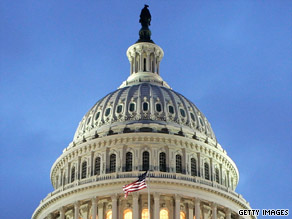New estimate puts health care price tag at $611 billion
- Story Highlights
- NEW: Estimate doesn't include cost of expanding Medicare
- Health care reform bill is being worked out in the Senate
- Budget office's new estimate puts costs at $611 billion over 10 years
- The figure is billions less than a June estimate, office says
WASHINGTON (CNN) -- A health-care reform bill that includes a public insurance plan and requires employers to cover workers would cost $611 billion over 10 years, far less than previous estimates, according to a new analysis from Congress.

Two senators say the chamber's work would provide health coverage for 97 percent of Americans.
The figure is hundreds of billions of dollars less than two June estimates by the nonpartisan Congressional Budget Office, including one that calculated the cost of a less-comprehensive program at $1.6 trillion over the same period.
But the new budget office analysis does not include the cost of a proposed expansion of the federally funded Medicaid system for low-income families, a proposal expected to add several hundred billion to the tab.
The Democratic leaders of the Senate Health, Education, Labor and Pensions Committee, one of two committees working on an overhaul, said the latest proposal "virtually eliminates the dropping of currently covered employees from employer-sponsored health plans."
"In addition, our bill, combined with the work being done by our colleagues in the Finance Committee, will dramatically reduce the number of uninsured -- fully 97 percent of Americans will have coverage, a major achievement," Sens. Edward Kennedy, D-Massachusetts, and Chris Dodd, D-Connecticut, said in a letter to members of the health committee.
An earlier budget office report put the 10-year cost of a less comprehensive bill from the health committee at about $1 trillion. And a mid-June report on Finance Committee proposals weighed in at $1.6 trillion.
Sen. Max Baucus, the Finance Committee's chairman, said last week that revisions had reduced the budget office estimate of his panel's plan to less than $1 trillion.
Meanwhile, Thursday's report did not include the Finance Committee's plan to extend Medicaid coverage to about 20 million more people. The cost of that plan has not been calculated but is estimated to run into the hundreds of billions of dollars. ![]() Watch an analysis of the health care debate »
Watch an analysis of the health care debate »
Supporters of a public plan, including President Obama, have argued that a government-administered insurance program would keep down costs, and Obama said in a White House statement Thursday that the latest health committee proposal "reflects many of the principles I've laid out."
"The public option would make health care affordable by increasing competition, providing more choices and keeping the insurance companies honest," he said. "The legislation also improves the quality of patient care, improves safety for patients and strengthens the commitment to preventive health care: preventing people from getting sick in the first place."
Don't Miss
Obama has called on Congress to pass a health-care reform bill before the end of the year. But Sen. Charles Grassley, the ranking Republican on the Finance Committee, said Thursday that he doesn't want "a government-run health care system" and that Congress should move carefully.
"I want to finish health care reform if we can, if we can do it in a bipartisan way and not screw everything up for our health care system," he said. "But we've got to be cautious as we do it, because, you know, we aren't just affecting health care. We're actually restructuring about one-sixth of our economy."
The bill touted Thursday would require employers to pay for health insurance for their workers or pay a $750 fee per worker, per year for every full-time employee and $375 for part-timers. Companies with fewer than 25 employees would be exempt from the assessment.
But plans for a public option -- which would compete with private plans -- have run into criticism from Republicans, some Democrats and private insurers. The National Federation of Independent Businesses, the nation's largest and most influential small business group, also opposes the idea.
The new head of the American Medical Association, which told a Senate committee in May that it would not support a public plan, said Wednesday that the group is open to a government-funded option for people without coverage.
Dr. J. James Rohack said the association opposed expanding Medicare coverage for senior citizens into a broader general public plan, noting that the program is "going broke" and fails to cover the costs of participating doctors.

And the Main Street Alliance, a group that lobbies on behalf of other small businesses, says its survey of 1,200 owners and entrepreneurs in 12 states found that 59 percent prefer a public option.
A CNN-Opinion Research Corp. survey released Wednesday morning found that a bare majority -- 51 percent -- support Obama's health-care plans, but most worry that their costs would go up, and only one in five think their families would be better off.
CNN's Ted Barrett contributed to this report.
All About U.S. Senate • Health Care Costs • Health Care Policy

 Sit tight, we're getting to the good stuff
Sit tight, we're getting to the good stuff